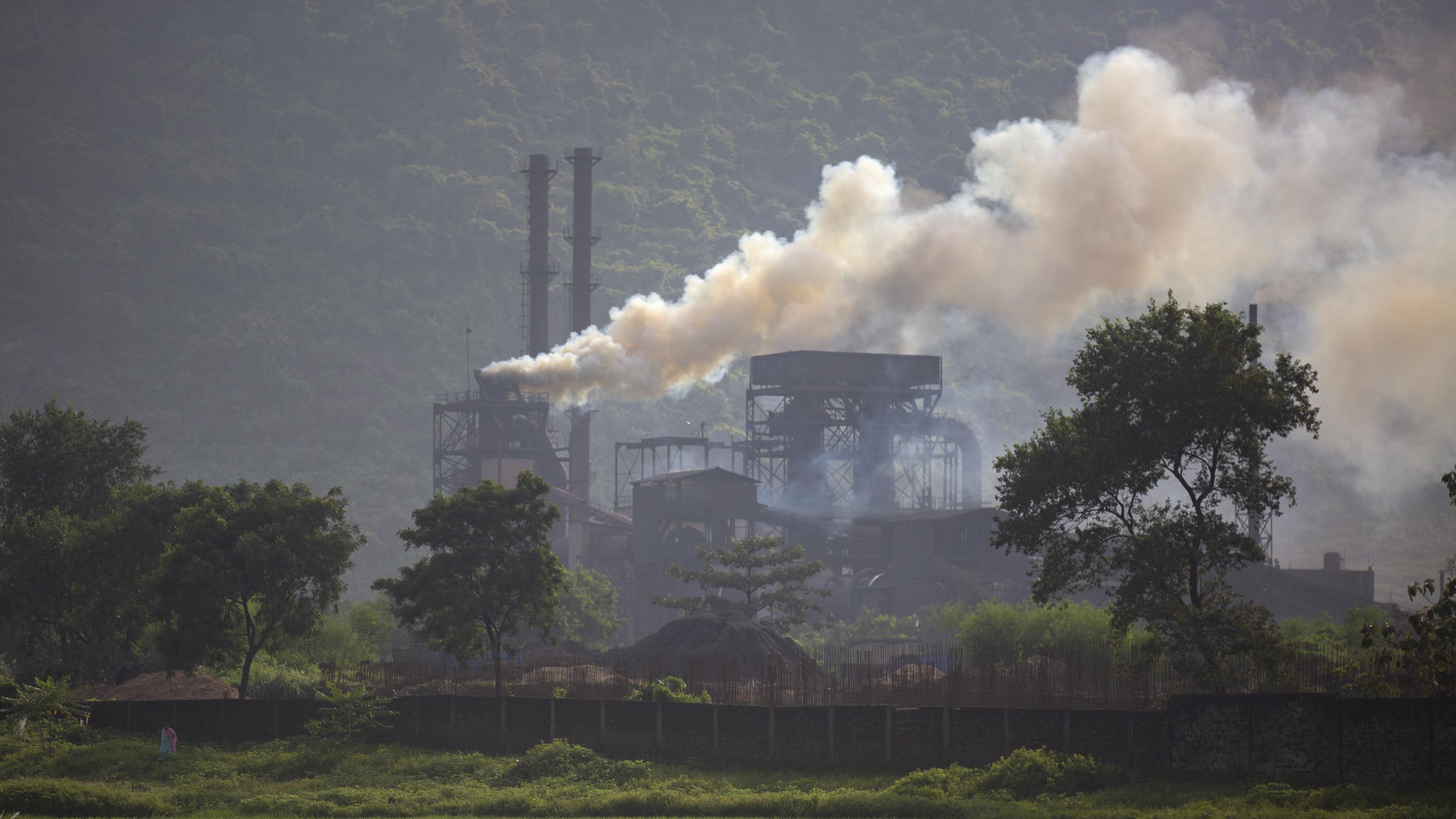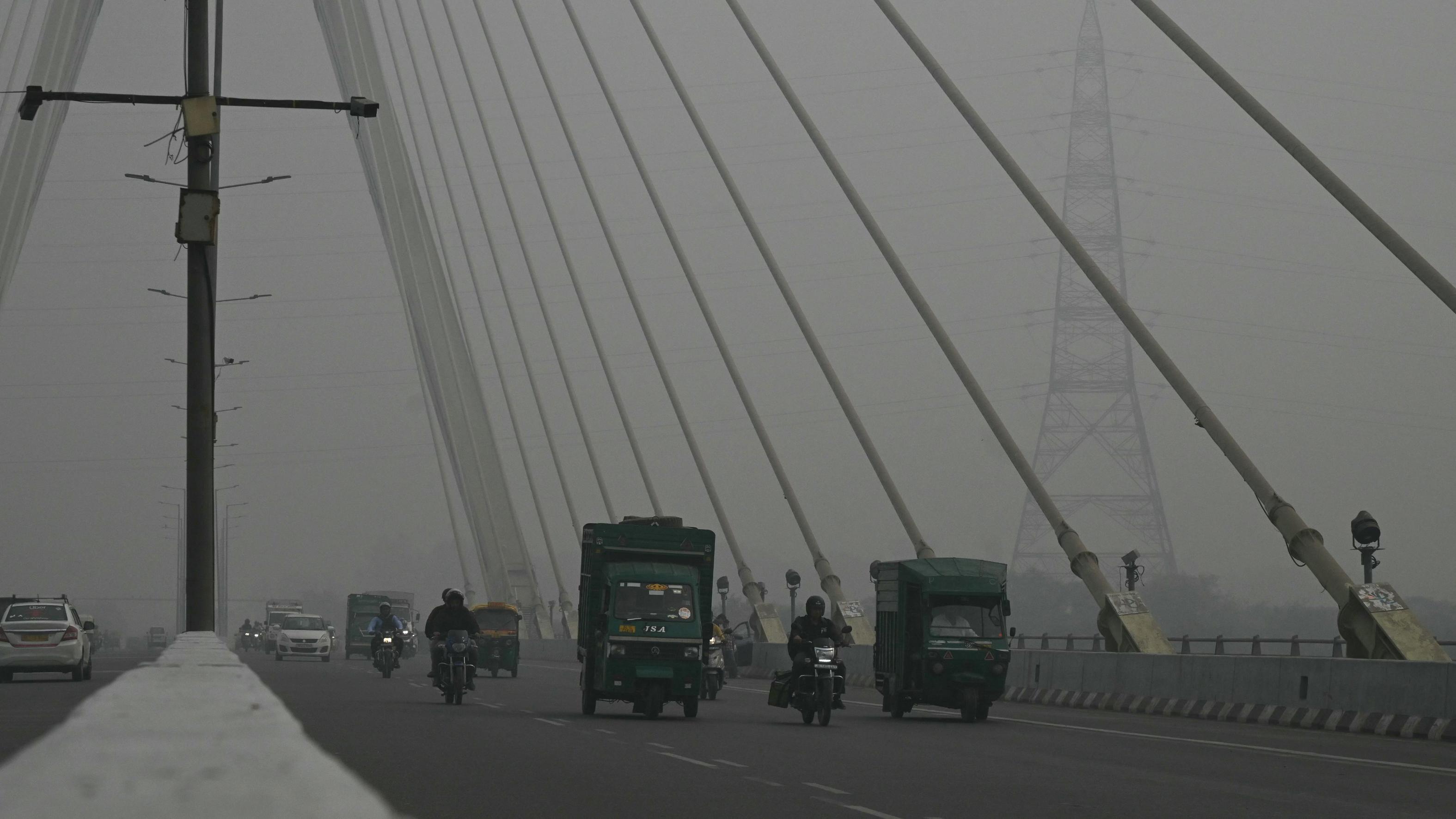 Smoke rises from a coal-powered steel plant at Hehal village near Ranchi, in the eastern state of Jharkhand, India, Sept 26, 2021. (PHOTO / AP)
Smoke rises from a coal-powered steel plant at Hehal village near Ranchi, in the eastern state of Jharkhand, India, Sept 26, 2021. (PHOTO / AP)
As New Delhi continues to struggle with worsening air pollution, an Indian delegation led by Prime Minister Narendra Modi is heading to the United Nations COP28 climate change summit with the chance to meet the country’s decarbonization and clean energy mission goals.
Early last month, the Indian capital was again the most polluted city in the world. The “hazardous” air quality levels, prompted authorities to take drastic measures including the closure of schools.
On Nov 27, New Delhi’s air quality again turned to a severe level. Every winter, north India’s air quality reaches hazardous levels and has become an annual blight.
Without India’s support, it will be difficult to reach a consensus at COP28 and if you look at the on-the-ground reality you cannot ignore the importance of coal, said World Coal Association CEO Michelle Manook
Against this background, Modi will make a two-day visit to Dubai, UAE from Nov 30 to attend COP28, underlining the country's commitment to the issue of climate change, the government said in a statement.
READ MORE: Reeling under toxic air, India's capital shuts schools
Climate change has been an important priority area of India’s G20 Presidency this year and significant new steps have been captured in the New Delhi Leaders’ Declaration and other outcomes during its tenure.
COP28 will provide an opportunity to take forward these successes, according to a press statement issued by India’s Federal Ministry of External Affairs on Nov 27.
Discussions over phasing out fossil fuels and financing the energy transition will be the crucial topics at the COP28 climate summit, which runs from Nov 30 to Dec 12 in Dubai, the United Arab Emirates.
Without India’s cooperation, reaching a consensus on the phasing out of CO2-emitting fossil fuels at the summit is impossible, experts said.
COP28 may witness a major divide between developed and emerging economies on the issue of coal dependency, the experts added. Burning coal, oil, and gas produces the greenhouse gases that are the main cause of climate change.
READ MORE: UN: COP28 must set stage for immediate climate action
Without India’s support, it will be difficult to reach a consensus at COP28 and if you look at the on-the-ground reality you cannot ignore the importance of coal, World Coal Association CEO Michelle Manook told this correspondent on the sidelines of a recent event in New Delhi.
 Vehicles make their way along the Signature Bridge amid heavy smog conditions in New Delhi on Nov 9, 2023. (PHOTO / AFP)
Vehicles make their way along the Signature Bridge amid heavy smog conditions in New Delhi on Nov 9, 2023. (PHOTO / AFP)
“For too long, our global coal value chain has allowed anti-coal sentiment to dominate and fragment us, which has resulted in a lowering of the global coal IQ,” Manook said in a press statement.
If the intention of the global community and the Western countries is to actually reduce emissions and support developing and emerging nations, then abated coal technologies have to be on the table.
Michelle Manook, World Coal Association CEO
At the New Delhi event, the World Coal Association rebranded as FutureCoal – The Global Alliance for Sustainable Coal. The coal industry trade body changed its name in a bid to revamp the image of the fossil fuel and attract new members.
FutureCoal said that negative sentiment surrounding coal had “diminished the capacity and progress” of vulnerable developing nations.
India is the world’s third-largest energy-consuming country and meets more than 80 percent of that demand with coal and oil.
ALSO READ: COP28 puts spotlight on turning methane pledges into action
Last year India set a target to increase coal production to 1.2 billion metric tons by 2023-24 and India’s overall coal production has seen a growth of about 22.6 percent in the 2022-23 fiscal year, according to India’s Coal Ministry.
Coal is the most important and abundant fossil fuel in India and accounts for 55 percent of the country's energy needs, the Coal Ministry stated.
However, India generated approximately 73 percent of its electricity from coal last year, according to reports, despite having increased its non-fossil capacity to 44 percent of its total installed power generation capacity.
Manook from FutureCoal underscored that there are technologies, particularly for thermal coal, which can abate up to 99 percent of emissions.
“We did a cost-benefit study that demonstrated if you abated coal with clean technologies, it was actually cost-effective compared to a green alternative," Manook said on the sidelines of the New Delhi event.
READ MORE: India's top court tells states to stop crop burning
"If the intention of the global community and the Western countries is to actually reduce emissions and support developing and emerging nations, then abated coal technologies have to be on the table," Manook said.
The 27 European Union member countries have unanimously agreed to call for a phase-out of “unabated” fossil fuels at COP28.
India cannot eliminate fossil fuels within a short time and everyone has to come together to reach a consensus at COP28, FutureCoal board member Sunil Chaturvedi said.
India is making huge investments in renewable energy and has taken many measures to modernize its power plants. The Indian government is making efforts to better utilize coal for major economic uplift without polluting the environment, Chaturvedi said.
ALSO READ: Indian power plants 'should be compensated' for importing coal
Millions of people involved in the Indian coal sector will be unemployed if coal-based industries are eliminated, said Umesh Chandra Kulshrestha, a professor at Jawaharlal Nehru University in New Delhi. Phasing out fossil fuels is a shortsighted view, he added.
At 2021’s COP26 negotiations in Glasgow, Scotland, India led a last-minute objection to language in a proposed joint statement on phasing out coal.
India’s ambitious 2030 decarbonization target, which includes decarbonizing energy to 50 percent, was announced at the same summit.
The writer is a freelance journalist for China Daily.


